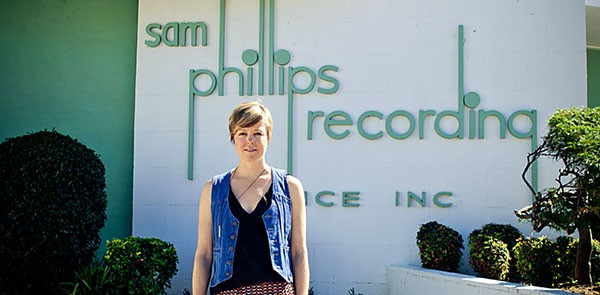While “The Memphis Sound” was refined and heralded from the 1950s-’70s, attracting artists from all over the world, it lost its drawing power as the last century drew to a close. But lately it’s been on the rise again, exhibit A being the mega-hit “Uptown Funk,” recorded at Royal Studios. I spoke with producer Matt Ross-Spang about recording singer/songwriter Emily Barker’s soulful new album, Sweet Kind of Blue, and why international artists fall in love with not just Sam Phillips Recording Service, but the city and its people.
 Stacie Huckeba
Stacie Huckeba
Memphis Flyer: Is Memphis attracting more artists who want a certain sound?
Matt Ross-Spang: They’re coming now. I used to joke about this — it seems like they always come and do the one funky track. “We have this one funky song, so we’re gonna go to Memphis.” And that would end up being the coolest song on the record. But really, you should do the whole record here. And you gotta finish it here. You gotta do the whole thing here, or it’s not the same feel.
Emily was looking for a producer. She talked about cutting it in Nashville, but I really wanted her to see Memphis. So we met here and did some songwriting. Of course, I took her to Pho Binh and Gus’s Fried Chicken, and it was over after that. She wanted to do the whole thing here.
It’s funny how this room, but also this city, is like the extra member in the band. It really influences people, the sound and song choice, the way people play. So I’m a big proponent of trying to get everyone I can to come here because it’s such an integral part of what we do.
That sense of place, that sense of a particular room, is part of the magic of older recordings. Even when doing overdubs, you get settled in there, you don’t mail tracks from L.A.
Yeah, I agree. It’s everybody in a room together. Whether they do it at the same time, or in parts, everyone’s there as one unit. The stuff Sam Phillips did, or Willie Mitchell, or Chips Moman, you can tell it’s their record, but they don’t put their fingerprint on it so much that it changes the artist’s sound. They just help facilitate, but at the same time you know that was cut at Royal, or it was cut at American. I love that kind of thumbprint on the track.
So how was Emily’s record put together?
I like to do it all on the floor. I don’t like people to memorize or chart the song before we get there. So she let me put the band together, and I got some of my favorite Memphis guys. We just let, in this case, Steve Potts, Dave Smith, Rick Steff, and Dave Cousar come up with parts, maybe change a chord. And it’s always lovely when an artist is okay to let you get your hands all over their songs. She’d show us the song, 30 seconds later we’re playing it, and there’s no overthinking it. A lot of these were country songs, and they became grooves. She was really great with letting that happen.
There were no rehearsals. Everything was nailed in two or three takes. It’s all live vocals on Emily’s part. The only thing we punched would be a harmony or strings or something. The musicians have all played together many times, but it’s been a while, so it was like a really cool family reunion. And they just killed it. I still get goosebumps listening to “Sister Goodbye.” I think that was the first one we tracked, and it set the tone for the whole record. Emily played and sang live. We went till we got the take. And we all loved the rough mixes that [engineer] Jeff Powell did right after tracking. So I just added a little reverb now and then, and it was done. It was a matter of “don’t ruin it; we already had it.”
Emily Barker plays the Levitt Shell Sunday, October 15th at 7 p.m.